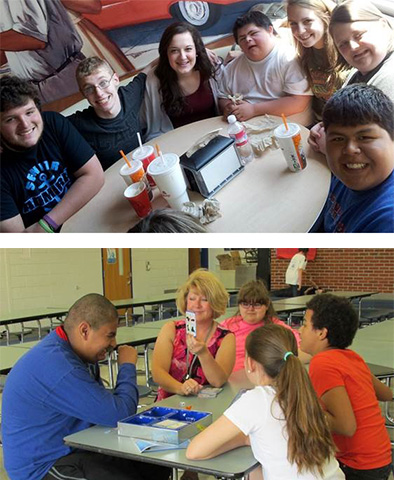Kentucky Peer Support Network Project Fosters Friendship and Inclusion for Students with Disabilities (KY UCEDD)
May 10, 2016

|
For students with disabilities, it can sometimes be difficult to engage with their peers, both socially as well as academically. The Kentucky Peer Support Network Project aims to assist in connecting these students with their peers through two initiatives: Peer Support Arrangements and Peer Networks. The project is based on the work of Dr. Erik Carter of Vanderbilt University, who acts as the project's primary consultant.
Peer support arrangements allow a student with a significant disability to receive support in general education classes from two to three trained peers, allowing the student to learn with his or her classmates, practice social skills, and potentially build lasting friendships. A peer network is a group of three to six students without disabilities who are matched with one student with a significant disability, and meet weekly to enjoy an activity together and to plan additional activities that the network can do outside of its weekly meeting. Both peer supports and peer networks are being piloted in Kentucky schools today, and work in tandem to lay the groundwork for genuine friendships among all students who participate.
Peer supports fill a portion of the role that would typically be filled by an adult paraprofessional. One-on-one adult support can certainly enable a student with a significant disability to participate in a general education classroom, but this situation often impedes the fostering of social interactions between the student and his or her peers. Peer support arrangements allow students with disabilities to still receive the academic support they require, but also allow them to practice social and communication skills, and build friendships as well. These peer supports do not supersede learning for the peers providing support; all students involved are present to learn the material, and peers providing support may actually learn the material better because they are providing that support! A peer can assist the focus student (the student with a disability) in taking notes, encouraging the student to ask questions, explaining directions, and partnering for group work. Peer support arrangements allow students with disabilities access to general education classes, not only allowing them to keep up with their peers academically, but providing them with opportunities to grow socially as well.
Peer networks are built to encourage true friendships among all students, allowing a student with a significant disability the chance to interact and socialize with his or her peers outside of the classroom. The goal of a peer network is to provide a space and an opportunity for students with disabilities to make connections and form meaningful friendships with their peers at school. These peer networks are typically lead by an adult facilitator at the school, who then fades that support as the group bonds and gains independence in their interactions and planning. Ideally, these peer networks will spend part of their weekly meetings planning other social connections as well, especially outside of the school setting.
The Kentucky Peer Support Network Project was funded by a three-year grant from the Commonwealth Council on Developmental Disabilities, and has entered its third operational year. The project's website, kypeersupport.org, has been newly revamped to create easier access to project materials, allowing schools not currently involved in the project to see what it is about, and provide resources for those schools who want to implement similar initiatives amongst their students.
Results
In the 2014-2015 school year, 95% of students with disabilities who participated in the project reported that they have friends at school that they would like to continue to meet with, even outside of the context of their peer network or peer support. When asked to complete a brief survey about the project, one focus student wrote, "they always make me laugh even when I'm down." One of the peers without disabilities had this to say: "I have enjoyed making new friends! Also to have friends with people who aren't usually my friend." A parent of a student with a significant disability noted that "Overall, I think this is a wonderful experience and we are lucky to have [student's name] in such a great school!" A parent of a participating student without a disability has credited the project for increasing his child's empathy and compassion with all people. The parent says that the project is the best educational and human experience he has ever seen.
The work done at the 11 pilot sites has been very encouraging, and HDI hopes to continue to provide these resources for all schools who see the value in establishing a system that treats students with disabilities as peers of all other students in their schools.







